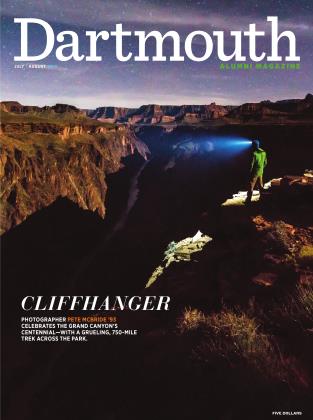FACULTY BOOKS
notebook
CAMPUS
DAVID G. BLANCHFLOWER
Economics Professor
Not Working
A former member of the Bank of England Monetary Policy Committee writes that low U.S. unemployment figures paint a false picture.
By practicing what he calls the “economics of walking about,” Blanchflower shows that many people are underemployed and have given up on finding a good job and that the economic recovery has failed to recoup losses caused by the crash of 2008.
Princeton University Press (June 2019), 424 pp„ $30
JAMES E. DOBSON
English Lecturer
Critical Digital Humanities
Humanities scholars increasingly use computers to analyze texts.
Some have gone so far as to say traditional literary analysis is obsolete. Literary theorist Dobson, an expert on intellectual history and U.S. autobiographies, contends that these two means of evaluation can co-exist, and he warns that scholars ought not give too much deference to data mining and algorithmic tools. “Dobson explains how humanistic critical theory and computational science might be considered complementary rather than antagonistic modes of inquiry,” notes Dartmouth English professor Don Pease, author of The New American Exceptionalism.
University of Illinois Press (March 2019), 196 pp„ $25
JEFFREY A. FRIEDMAN
Government Professor
War and Chance
Friedman’s research focuses on how risk affects national security decisions. Here he offers ways in which foreign policy analysts can better assess uncertainty in international affairs to make sound choices. Former CIA analyst Paul Pillar ’69 calls the book “an invaluable guide to thinking about the unknown.”
Oxford University Press (May 2019), 240 pp„$35
RUSSELL MUIRHEAD
Government Professor
A Lot of People Are Saying
Think conspiracy theory—without any theory. Muirhead and his coauthor identify and examine a “new conspiracism,” in which truth, evidence, sources, and dot-connecting don’t even remotely underlie the claims of government leaders. They argue that this not only threatens our ability to reason, compromise, or even disagree, it undermines democracy.
Princeton University Press (April 2019), 232 pp„ $27
 View Full Issue
View Full Issue
More From This Issue
-
 FEATURE
FEATUREAmerican Odyssey
JULY | AUGUST 2019 By JAMES D. WALSH -
 FEATURE
FEATUREThe Voice
JULY | AUGUST 2019 By RICK BEYER '78 -
 CLASS NOTES
CLASS NOTESClubs & Groups
JULY | AUGUST 2019 -
 PERSONAL HISTORY
PERSONAL HISTORYMeet the Beatles!
JULY | AUGUST 2019 By RICHARD HERSHENSON ’67 -
 notebook
notebookOn the Road Again
JULY | AUGUST 2019 By BETSY VERECKEY -
 notebook
notebookLosing Hart
JULY | AUGUST 2019 By JAMES PANERO '98
Notebook
-
 notebook
notebookWhy Dartmouth?
JANUARY | FEBRUARY 2018 -
 notebook
notebookWinter Sports
MAY | JUNE 2018 -
 notebook
notebookJoy to the World
JANUARY | FEBRUARY 2022 -
 notebook
notebookHow to Live Long and Prosper
NOVEMBER | DECEMBER 2017 By James Napoli -
 notebook
notebookLosing Hart
JULY | AUGUST 2019 By JAMES PANERO '98 -
 notebook
notebookHuman Steady Cam
SEPTEMBER | OCTOBER 2021 By Maud McCole ’23

